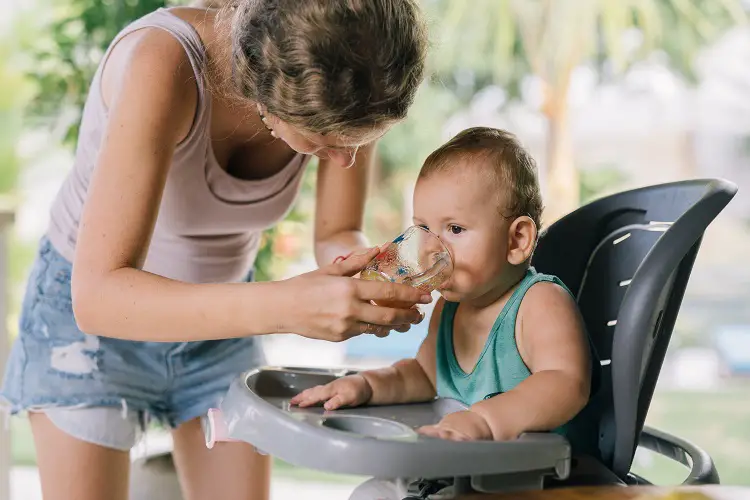Gas and tummy troubles are almost par-for-the-course in newborns due to their immature digestive systems. As first-time parents, you will have no idea what to do.
I could recall my mother talking about the umpteen benefits of gripe water and how it calms a baby? As you know, at some point babies suffer from stomach issues and gripe water usually suggested.
Yes! Gripe water is easily available in various medical stores, but the constituents used in it may not always be suitable for your baby. Hence, you must opt for homemade gripe water, which is safe for a baby.
In this article, we will be discussing how to make gripe water, how well does it work to relieve gas bubbles (among other ailments), and if it is right for your baby?
What Is Gripe Water?

This is an over-the-counter liquid supplement of sodium bicarbonate and herbs (such as fennel, ginger, chamomile, cardamom, licorice, cinnamon, clove, lemon balm or peppermint, depending on the formula) that many parents use as a cure for colic and stomach upsets in newborn babies.
However, most commercially available gripe water contains a mixture of the following herbs:
- Clove
- Fennel
- Ginger
- Chamomile
- Lemon Balm
Gripe water has been in existence for a long time. In the 1840s in England, It was first used to treat a malarial disease known as fen fever.
However, many parents, who use gripe water to soothe colic, believe the colic is caused by a baby’s stomach troubles or gassiness. Thus, these herbs help to ease gas, hence relieving the discomfort that is causing the baby to cry.
How Does Gripe Water Work?
In the 1850s in England, the original gripe water was first used by nannies and mothers. This gripe water contained alcohol which people used to think relaxed babies (now we know that giving any alcohol to a baby can be toxic).
Nowadays, believers say some of the ingredients in certain gripe water formulas like dill, licorice, fennel, and ginger can help relieve gas and stomach discomfort (and in turn may be beneficial for infants with colic, which is thought to be caused at least in part by gas).
Some experts also believe that gripe water might be effective at soothing fussy babies simply because it tastes sweet.
How To Make Gripe Water For Baby At Home?
For you to make gripe water at home for your baby, you only need a few specific ingredients. It is important to note that gripe water provides its beneficial effects for only a week or so. Hence, any remaining water should be frozen to keep its effectiveness intact.
Ingredients Required
The ingredients required to prepare gripe water at home are as follows:
- Ground clove
- Ground cinnamon
- Coconut sugar or strictly natural sweeteners
- Dried and crushed cardamom
- Dried and crushed fennel seeds
- Dried chamomile flowers
- Fresh ginger, sliced
- Purified water
How To Prepare Gripe Water
Preparing gripe water using the above-mentioned ingredients is not a complex process. The steps to take are as follows:
- Firstly, take purified water in a large pan or a kettle and let it boil.
- In a cloth tea bag, take cardamom, fennel, chamomile, and ginger.
- Once the water boils, turn off the heat and insert the bag into it. Then let the bag sit in it for about 30 minutes.
- Finally, remove the bag from it after 30 minutes and add coconut sugar or any other sweetener, ground clove, and cinnamon. Mix it well and give it to your baby once it cools down. Store the rest in the fridge in an airtight glass bottle.
It is best advised to go for homemade gripe water as it is always better than the ones commercially available as you are sure of the way it has been prepared and there is no trace of adulteration in it. This quick recipe will deal with all the stomach problems of your baby in a short time.
Read Also: 13 Best Ways To Burp A Baby
The Benefits Of Ingredients Used In Homemade Gripe Water
The preparation of gripe water makes use of very specific ingredients. These have all been chosen for an important reason since each ingredient adds an essential benefit to the gripe water.
When these benefits combine, the cumulative effect is what relieves the gas-related issues and other digestive problems within the baby.
Cloves
Cloves form an important part of various natural remedies and are highly recommended for respiratory issues too.
How It Help?
Cloves consist of numerous properties that directly impact the digestive system, reducing any kind of bloating caused by digestive activities, as well as calming the inner body with its pain-relieving properties.
Natural Sweetener
A baby will have gripe water only if it tastes well, hence adding sweetener to it is important.
How It Help?
Instead of going for natural sugar, coconut sugar is recommended as a sweetener as it is easier for the baby to digest it. Any artificial sweeteners or even honey is to be avoided at all costs.
Cinnamon

A pinch of cinnamon powder mixed with water is immediately given to people with a stomach ache. Cinnamon makes an important ingredient of gripe water for the immense benefits it offers to the baby.
How It Help?
Cinnamon has been known to work wonders in reducing gas and treating indigestion problems. Therefore, it is included in gripe water.
Chamomile
The benefits of chamomile tea have been known to be great for the body in matters of controlling pain and calming the mind. So, adding chamomile to gripe water will help the baby in case of any pain.
How It Help?
Chamomile flowers used in the preparation of gripe water will ensure that any inflammation inside the baby gets a soothing effect and allows the little one to relax and sleep well.
Fennel Seeds
The benefits of fennel seeds are quite exhaustive and their effect on the body, right from improving the health to relieving various stomach issues have been well-known for quite some time, this is why adding them in gripe water would prove beneficial for the baby.
How It Help?
Fennel seeds have laxative properties and they also contain an important property of preventing the formation of gas, making them an effective addition in the gripe water preparation.
Ginger

Ginger is an essential ingredient used in numerous natural remedies and the effects of ginger can be listed extensively in matters of keeping the digestive system intact.
How It Help?
Any chances of a baby suffering from diarrhea, colic infection, indigestion, or any other stomach problems are nipped in the bud with the gripe water that contains ginger in its preparation process.
Alternatives To Gripe Water
You may want to consider alternative ways of soothing your baby, If you’re not completely comfortable using gripe water to relieve your baby’s symptoms and calm those cries, here are some other things you can do:
- Swaddling the baby.
- If you’re breastfeeding your baby, monitor what you may be eating or drinking that could cause digestive problems and discomfort in your newborn.
- Applying gentle pressure to the baby’s belly.
- Rubbing the baby’s belly in gentle circular motions to help work outgas.
- If you’re formula-feeding your baby, consider switching to a gentler brand as directed by a pediatrician.
- Try Bicycle your baby legs. Sometimes by moving your baby’s legs around and around in a bicycle-wheel motion helps relieve the gas that might be causing her so much discomfort.
- Another possible remedy to ask your doctor about is probiotic drops, which could reduce gas pain and digestive problems in babies and also quiet their cries. Research has yet to consistently back this up, however.
- Distracting the baby.
- Trying white noise.
Is Gripe Water Safe?
Well, this depends on the specific brand and ingredients. You should always ask your doctor for a recommendation for gripe water and any other remedy you’re thinking of giving your baby.
Gripe water made with alcohol isn’t safe, and other formulas, including those labeled “natural” or “homeopathic” (depending on where they’re made and what’s in them), contain a variety of other ingredients that may be unsafe or untested.
Gripe water made with sucrose, while not dangerous, might not be the best choice, either, because you don’t want to get your baby used to be soothed with sugar. So always check with your doctor first and ask for a recommendation (and if it doesn’t work, let him or her know).
And remember, even if you do try gripe water as a remedy for digestive troubles with your pediatrician’s approval, it should never be given in large quantities to a baby or used as a dietary substitute. Infants, this age should be fed breast milk or formula (or a combination of the two) only.
Tips For Using Gripe Water
If your pediatrician does give you a recommendation for a kind of gripe water that’s safe for baby, consider following these tips:
- Always Study The Ingredients Carefully: Look out for vegetable carbon (charcoal), as it may cause constipation. Only buy brands that are alcohol and sucrose-free and made in the United States.
- Study The Instructions: The ingredients in gripe water brands vary, and most have different instructions for use. So before tearing open the box, ensure you read the label carefully (and again, ask your pediatrician about brands, dosing, and use before giving it to your little one). Some brands recommend that you should wait until your baby is at least 1 month old before use. And almost every brand varies when it comes to how long you should use the product, so be sure to read up and get sound medical advice before you dole out doses.
- Watch For Allergies: While gripe water isn’t likely to cause an allergic reaction, as with any new food or drink you introduce to your little one, you should still be on the lookout for symptoms of an allergy such as hives, itchiness, watery eyes, swelling of the lips or tongue, trouble swallowing or breathing, vomiting or diarrhea.
Conclusion
Remember all babies suffer from stomach issues at some point and the most important thing is how you tackle it as a parent. Having mentioned the benefits of the ingredients used in homemade gripe water, why not introduce it to your little by following the steps mentioned above, I’m sure you’ll be glad you did.
Did this article help you? Kindly share it with any mom who’s wondering how to make gripe water.
